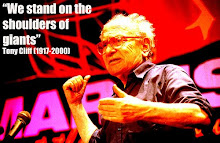Posted item #11 The family: haven in a heartless world?
In the early 1980s Cliff wrote a number of articles which contributed to a Marxist understanding of women's oppression and the struggle for liberation. There was a significant amount of debate about these issues within the Socialist Workers Party during the late 70s and early 80s - it took a long time to establish a clear 'party line', either theoretically or in respect of the best strategy to adopt.
It probably didn't help that the International Socialists (the SWP's forerunner) largely abstained from debates taking place in and around the women's movement that emerged in the early 70s. This arguably left the organisation in a weaker state on these important issues at a later stage. That's not to say there was no intervention in significant campaigns concerning women - struggles for better pay in the upturn of the early 70s, for example, and then an active role in the National Abortion Campaign later in the decade. But in this instance theory lagged considerably behind practice, and there was confusion about the orientation revolutionary socialists needed on the women's movement.
Cliff is admirably self-critical on this matter in his autobiography, in which he also took the sensible decision to invite Lindsey German, who has written the books 'Sex, Class and Socialism' and 'Material Girls', to contribute a brief account of the debates during this time (and how they connected with SWP activity). She rightly points out that Cliff's theoretical contributions such as articles and talks on Clara Zetkin and Alexandra Kollontai, neglected figures in the Marxist tradition, were very helpful. Above all, it was his book on 'Class Struggles and WOmen's Liberation' that contributed to revolutionaries establishing an analysis of where modern women's oppression comes from and why it persists, and also of how this can be transformed.
I'm posting here a chapter from this book. It doesn't do justice to the book as a whole, which is tremendously wide-ranging and synthesises the historical experience of struggle with some perceptive insights. It does, however, clarify Cliff's approach to the key issue of the family in capitalist society, with an impressive breadth of reference. Crucially, Cliff never loses sight of the importance of examining economic realities, whatever his focus.
Subscribe to:
Post Comments (Atom)

No comments:
Post a Comment